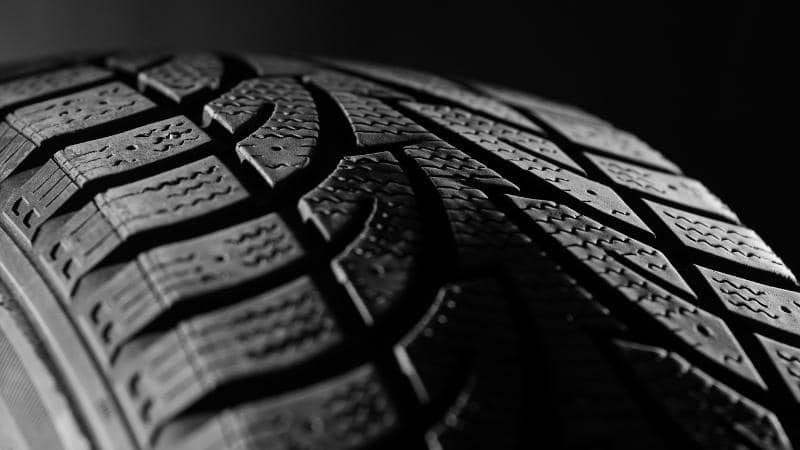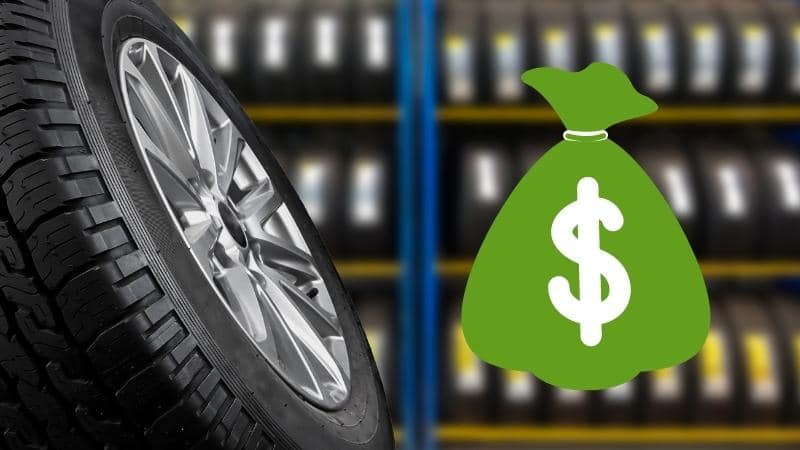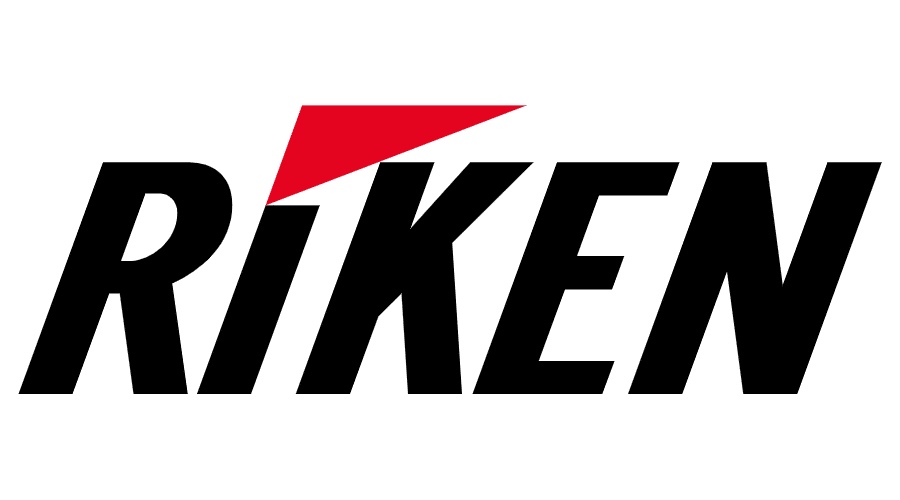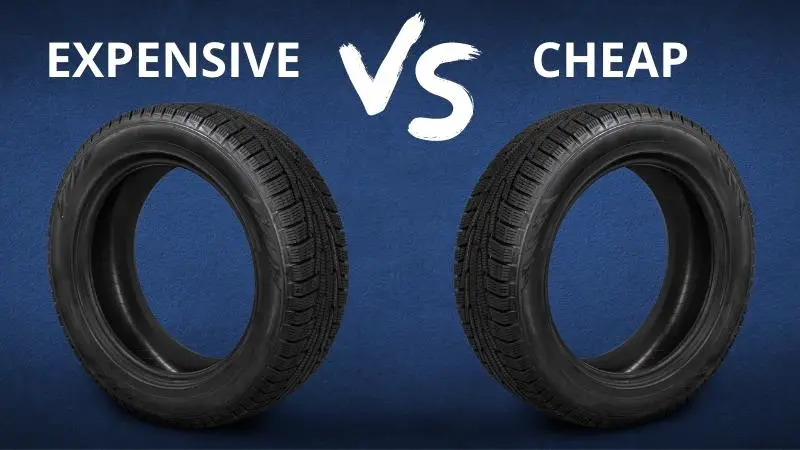When looking for new tires, most people are tempted to go for a less expensive brand to save some money.
Therefore they wonder, what is the difference between expensive and cheap tires? They often think; I will just pay for the brand name, and one material will perform just as well as any other, right?
Well, not quite.
The fact is that, more expensive, high-performance tires designed by premium tire manufacturers are better overall than those designed by budget tire manufacturers. Everything from rubber compounds to tread design is a result of intensive research and work, which costs a lot of money to conduct.
A cheap tire from an unknown company will very likely not perform as well on a wide range of road conditions compared to an expensive tire from a large manufacturer.
Premium Tires are Better and Safer Than Budget Tires
The improved performance benefits from premium tires have been realized through many different tests, with the most notable being the 2012 Autobild 50 Tyre Braking test.
These tests has shown that premium tires significantly affects your safety and likely the well-being of your wallet in the long-term.
After taking a test of the braking performance of several tires, the worst performer took 20 feet extra braking distance to stop on the dry surface compared to the best performer.
Furthermore, the difference increased even more on wet surface as the worst-performing tire took 50 feet of extra braking distance.
Other tests, specifically on vehicle handling has been conducted as well, where premium brands in all cases comes out on top.

Why Choosing More Expensive Tires is a Smart Idea (if Possible)
Regardless of how refined your all-wheel-drive system is or how powerful your vehicle brakes are, the only connection between your vehicle and the road is your tires. Therefore, having premium tires on your car will make sure that your car performance is at its peak. Premium tires will also last longer, actually saving you money in the long-term.
Like any other item you purchase, the tire quality and brand name will significantly influence how much it costs. Usually, the higher the quality, the higher the cost of the tire.
However, this does not imply that if you visit Cincinnati stores and get a discount, you will get a poor quality tire if you want to save a few coins. Several factors influence the price of tires, and quality is just one of them.
Once you understand the different factors that affect the price of a tire, you stand a better chance to gauge your options to acquire a good tire that is also pocket friendly.
Below is what you need to understand about what makes some tires expensive and others cheap.
Differences Between Expensive and Cheap Tires For Various Factors
Handling
High-quality tires provide better handling, and that will increase the price. Therefore, handling is not something you should look down at to save a few coins.
The best tires will increase the handling of your vehicle. They have a better grip on the surface so that the vehicle does not lose control easily on a wet surface or if the vehicle is driving at highway speeds. The tire will make turning better and easier.
With better handling, you are ensured of safety as you drive. It will enhance quick response to emergencies, make fast stops and avoid obstacles.
Durability
Durability is one of the most considered factors in any item, including tires, as it determines if you will get your money’s worth in the long run. After all, more durable tires will last longer, hence saving you money on acquiring new tires.
Several criteria are used to determine the durability of a tire. A tire with a softer rubber is likely to perform better. However, this implies that the tread will wear down faster with time for drivers. Hard rubber tires will last longer.
Reinforced tires with strong sidewalls will also last longer. These are not features that you can identify yourself as the tread covers up the steel frame. You can talk to your tire dealer to know more about tire construction and carry out a bit of research before shopping for a tire.
Tread

The pattern and thickness of the tire tread will significantly impact the price. Thick treads with wide grooves improve your car’s handling on ice, snow, rain, and mud. Unfortunately, thick treads make a lot of noise as you drive, which some people find disturbing.
Summer tires are usually designed with thinner treads for driving in dry conditions. These tires are more quiet, though they don’t provide as much grip on wet or rougher terrain.
Tread is essential when selecting tires that will best satisfy your driving needs, such as having winter tires for icy surfaces. Tires with thicker tread will cost higher, though thread alone does not increase the cost.
Noise Level
Expensive tires are often made with more rubber and have a very strong construction. These tires provide a quieter ride since they are made for precise performance. Low-quality tires tend to make a lot of noise while driving, disturbing and annoying at times.
Other factors such as the tread depth also contribute to the noise level of a tire. Therefore, noise level alone cannot be used to measure tire quality.
Comfort
Most of the features that improve your tire’s performance also help enhance the comfort of your ride. Higher-quality tires will provide a more comfortable driving experience as they are made to absorb the bumps and shocks better as you drive.
The driving experience is much smoother with higher-quality tires. In fact, higher quality will definitely come with a higher price tag.
Braking Distance
A shorter braking distance is considered as it will help you react more quickly to emergencies and obstacles. Each tire comes with an estimated braking distance. Those with shorter braking distances are more effective and likely to be more expensive.
Tires are not made to attain a given braking distance. Normally, the braking distance is only one of the tire’s general design results.
Drag
Tires with a higher drag will make it harder for your vehicle to work, thus increasing fuel usage. They will subject your car to more wear and cost you a lot of money in repairs and fuel in the long run.
Tires that have less drag come with a sophisticated design and are a little expensive. You should consult your tire salesman for a further explanation about the drag associated with the tire you want to buy and how the performance is calculated.
Status Name Brands
Sure, you are paying more for the brand name, although that name means superior quality. Such brands have toiled and invested a lot of money to get and maintain household names with a good reputation. This is to say, they are name brands for a purpose.
It is worth noting that such manufacturers guarantee higher quality, performance, and longevity for that additional coin. However, that does not mean you should make your decision based on the brand name alone!
Some brands offer the same quality tires at a lower price, which you should consider since they are still in the process of building their name and reputation.
The brand companies even design some cheaper brands, and they still provide some of their quality with no extra charge for the name.
The Benefits of Buying Expensive Tires

Acquiring more costly tires is obviously more of an expense. However, in many cases, the extra cost is usually a shrewder purchase if you consider the tires’ longevity and performance compared to cheaper tires.
There are a plethora of reasons to prove the idea that high-quality tire brands are worth the cost. Well-known manufacturers spend a lot of money researching and testing their products in a near-endless quench for perfection.
That implies that such tires are designed using a carefully honed and sophisticated manufacturing process to offer the best possible performance. They also apply chemists to help identify rubber compounds and get a suitable combination of materials for their tires.
Due to that reason, many car owners believe that premium tires are a better choice as their better performance makes them more economical in the long run.
The Benefits of Buying Cheap Tires
It goes without saying that the main benefit of acquiring cheap tires is the friendliness to your wallet. A pocket-friendly tire would be a better choice, especially if you had not planned for the purchase, like if you get a puncture and don’t have a spare wheel or if you’re simply short on cash at the moment.
There is a set standard such that tires should follow certain US and EU regulations which are imprinted on the tire labels.
What this does imply, though, is that pocket-friendly tires may lead to increased road noise, worse fuel efficiency, and/or poorer braking and handling performance. Most car owners argue that buying cheap tires is a false economy.
There are also recommendations from some specialists that cheap tires do not last for long before they wear out; thus, you are more disadvantaged than if you purchased a more expensive one. It goes without saying that cheap is always costly and “buy cheap, by twice.”
Is it Worth it to Buy Expensive Tires?
The short answer is yes, if you have the wallet muscles. As stated earlier, more expensive brand name tires will offer enhanced performance, safety, and longevity, according to several tests done.
As discussed earlier, this is well proven when the braking ability is put into consideration. In a given situation, the difference between a cheap tire and a top manufacturer’s tire is the braking distance of 30 feet on dry pavement. On the other hand, when the stopping distance on wet pavement is tested, the top manufacturer’s tire outshines its cheap cousin by almost 50 feet.
One could ask what a difference that would have been on the highway. Some specialists argue that regardless of how refined your all-wheel-drive system is or how powerful your vehicle brakes are, the only connection between your vehicle and the road is your tires. This shows why carrying out research on the tires you want to acquire is essential.
Using premium brand tires will have a warranty, optimum performance, and the highest level of safety in cases where it is required most. However, if you can’t afford premium tires at the moment, it is still wise to consider buying the biggest bang for your money.
Since cheap brands are not the same with the major manufacturers, you can still do a little research and get safe, well-performing tires that fit within your budget.
Some good premium brands include:
- Michelin Tires – You can read our brand review here
- BFGoodrich Tires – You can read our brand review here
- Pirelli Tires –
Is it Worth it to Buy Cheap Tires?
The quick answer is that your purchase decision should be guided by quality and not the price. Quality is more paramount than the price or the brand name.
Some expensive tire brands come with a cheaper subsidiary that is perceived to be of the same quality. For instance, Riken is a pocket-friendly tire brand sold by the well-known Michelin brand. This tire is not rock-bottom inexpensive; thus, it is considered mid-range in a more significant perception of the tire industry.
A budget tire, like Riken, from a well-respected company, is not a low-quality tire. It is less expensive since the marketing is less involved and the technology used is a bit older.

Learned employees at a tire store would know everything about such kinds of brand connections. Such brand connections may escape a non-informed buyer.
Some other good budget brands include:
- Triangle Tires – You can read our brand review here
- Firestone Tires – You can read our brand review here
- Westlake Tires – You can read our brand review here
Will More Expensive Tires Pay Off in The Long Run?
To answer this question, you must first examine the factors that dictate the price of a tire. They fall into a few groups: durability, safety, comfort, performance, and ultimately status. Most will accept that safety should come first.
By shopping for higher quality tires or getting quality tires at a lower cost, you are sure of enhanced handling and braking distance by a given brand’s manufacturers.
These two features alone are worth spending extra cash or adding the extra effort to research for a cheaper model that would offer the same features.
Finally as stated earlier, a more expensive tire will in most cases last longer, thus reducing how frequently you need to purchase new tires, allowing a more expensive tire to pay itself off in the long run.
Hi, my name is Niklas, the head content creator & CEO of Whirling Wheelz. I am very interested in vehicles of all kinds, mainly cars. I have a car mechanics degree from high school and a big hobby of mine is to follow the WRC (World Rally Championship) both online and through travel.


